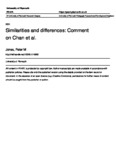Similarities and differences: Comment on Chan et al.
| dc.contributor.author | Jones, Peter | |
| dc.contributor.author | Mitchell, Chris | |
| dc.contributor.author | Wills, Andy | |
| dc.contributor.author | Spicer, Stuart | |
| dc.date.accessioned | 2021-08-16T09:39:21Z | |
| dc.date.issued | 2021-04-01 | |
| dc.identifier.issn | 0097-7403 | |
| dc.identifier.issn | 2329-8464 | |
| dc.identifier.uri | http://hdl.handle.net/10026.1/17587 | |
| dc.description.abstract |
Spicer et al. (2020) reported a series of causal learning experiments in which participants appeared to learn most readily about cues when they were not certain of their causal status and proposed that their results were a consequence of participants' use of theory protection. In the present issue, Chan et al. (2021) present an alternative view, using a modification of Rescorla and Wagner's (1972) influential model of learning. Although the explanation offered by Chan et al. appears very different from that suggested by Spicer et al., there are conceptual commonalities. Here we briefly discuss the similarities and differences of the 2 approaches and agree with Chan et al.'s proposal that the best way to advance the debate will be to test situations in which the 2 theories make differing predictions. (PsycInfo Database Record (c) 2021 APA, all rights reserved). | |
| dc.format.extent | 216-217 | |
| dc.format.medium | ||
| dc.language | en | |
| dc.language.iso | en | |
| dc.publisher | American Psychological Association | |
| dc.subject | associative learning | |
| dc.subject | theory protection | |
| dc.subject | prediction error | |
| dc.subject | cue competition | |
| dc.subject | causal learning | |
| dc.title | Similarities and differences: Comment on Chan et al. | |
| dc.type | journal-article | |
| dc.type | Journal Article | |
| plymouth.author-url | https://www.webofscience.com/api/gateway?GWVersion=2&SrcApp=PARTNER_APP&SrcAuth=LinksAMR&KeyUT=WOS:000674217500010&DestLinkType=FullRecord&DestApp=ALL_WOS&UsrCustomerID=11bb513d99f797142bcfeffcc58ea008 | |
| plymouth.issue | 2 | |
| plymouth.volume | 47 | |
| plymouth.publication-status | Published online | |
| plymouth.journal | Journal of Experimental Psychology: Animal Learning and Cognition | |
| dc.identifier.doi | 10.1037/xan0000277 | |
| plymouth.organisational-group | /Plymouth | |
| plymouth.organisational-group | /Plymouth/Admin Group - REF | |
| plymouth.organisational-group | /Plymouth/Admin Group - REF/REF Admin Group - FoH | |
| plymouth.organisational-group | /Plymouth/Faculty of Health | |
| plymouth.organisational-group | /Plymouth/Faculty of Health/Peninsula Medical School | |
| plymouth.organisational-group | /Plymouth/Faculty of Health/School of Psychology | |
| plymouth.organisational-group | /Plymouth/REF 2021 Researchers by UoA | |
| plymouth.organisational-group | /Plymouth/REF 2021 Researchers by UoA/UoA04 Psychology, Psychiatry and Neuroscience | |
| plymouth.organisational-group | /Plymouth/REF 2021 Researchers by UoA/UoA04 Psychology, Psychiatry and Neuroscience/UoA04 REF peer reviewers | |
| plymouth.organisational-group | /Plymouth/Research Groups | |
| plymouth.organisational-group | /Plymouth/Research Groups/Centre for Brain, Cognition and Behaviour (CBCB) | |
| plymouth.organisational-group | /Plymouth/Research Groups/Centre for Brain, Cognition and Behaviour (CBCB)/Cognition | |
| plymouth.organisational-group | /Plymouth/Research Groups/Institute of Health and Community | |
| plymouth.organisational-group | /Plymouth/Research Groups/Plymouth Institute of Health and Care Research (PIHR) | |
| plymouth.organisational-group | /Plymouth/Users by role | |
| plymouth.organisational-group | /Plymouth/Users by role/Academics | |
| dc.publisher.place | United States | |
| dcterms.dateAccepted | 2021-02-27 | |
| dc.rights.embargodate | 2021-9-18 | |
| dc.identifier.eissn | 2329-8464 | |
| dc.rights.embargoperiod | Not known | |
| rioxxterms.versionofrecord | 10.1037/xan0000277 | |
| rioxxterms.licenseref.uri | http://www.rioxx.net/licenses/all-rights-reserved | |
| rioxxterms.licenseref.startdate | 2021-04-01 | |
| rioxxterms.type | Journal Article/Review |


